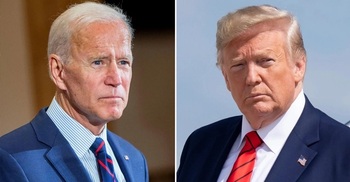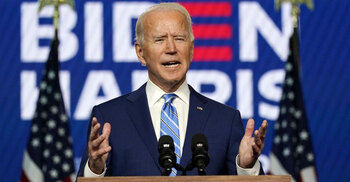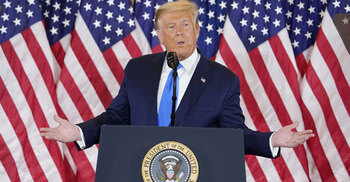US markets soar despite election uncertainty

US stock markets have recorded their biggest post-election leap in decades despite continuing uncertainty over which candidate will win the race, reports BBC.
Shares rallied as investors bet the closer-than-expected results reduced the chance of big changes for business.
Tech and health firms, now seen as less likely to face new regulation, led the gains.
Facebook shares rose more than 8%, while several major health insurance firms saw double-digit jumps.
The Dow closed up more than 1.3%, while the wider S&P 500 climbed 2.2%. The tech-heavy Nasdaq gained nearly 3.9%.
"The thinking in the markets ... is it looks like it's divided government regardless of who takes the White House," said Chris Low, chief economist at FHN Financial. "That means a lot less probability of big sweeping legislative change, big sweeping spending or tax programmes and therefore a lot less uncertainty."
With millions of votes still to be counted, incumbent President Donald Trump and his challenger, Democrat Joe Biden, are neck and neck in key swing states.
But predictions of a possible early landslide win for Mr Biden and his party in Congress failed to materialise. Early Wednesday morning, Mr Trump prematurely claimed victory, and later moved to challenge vote counts in some states.
Against some expectations, however, the uncertainty over the outcome did not appear to worry US financial markets, which have proven resilient this year despite a crash in March triggered by the coronavirus.
There was a brief sell-off in the overnight US futures market, as investor hopes faded that a so-called Blue Wave win by Democrats would usher in a major spending package for coronavirus relief and drive share prices higher.
But shares bounced back as investors bet the close race reduced the likelihood of other possible changes, such as an increase in the corporate tax rate proposed by Mr Biden.
"Divided government makes sweeping legislation inherently hard," said economist Michael Pugliese of Wells Fargo. "We are sceptical that outside of Covid relief much other major economic policy legislation would become law."
Business lobby group Chamber of Commerce claimed the election as a win for business interests, pointing to Republican resilience in the House and Senate.
The group also cited the results of some state-level fights - such as a victory in California by tech firms Uber and Lyft, which will exempt them from a law mandating stronger worker benefits.
"There's clearly some indication from voters across this country that they are focused on supporting a pro-growth, pro-business agenda," chief policy officer Neil Bradley told reporters.
The gains in the S&P 500 and the Dow were the biggest for a single day following a presidential election in at least four decades.
Indexes in Europe closed higher too, climbing back after a sharp fall following incumbent President Donald Trump's premature victory speech. Asian markets also mostly rose on Wednesday.
Mr Bradley said he was optimistic wins by pro-business centrist politicians would prompt quick action on items like further stimulus, noting remarks on Wednesday by Republican Senate Leader Mitch McConnell promising to move on a deal.
But with coronavirus cases rising, markets could still be in for a bumpy ride, warned Ian Shepherdson of Pantheon Macroeconomics.
"The bottom line ... is that we are now much less bullish on growth in the first half of next year, though we remain of the view that pent-up demand will generate a massive wave of post-vaccine spending on discretionary services later in the year," he said. "The next few months likely will be tough going for the stock market; much will depend on how quickly vaccines can be approved and rolled out; that's unknowable at this point."







